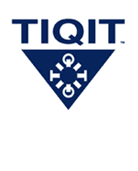|
|
 |


Tiqit—TIny ubIQuITous Technology—Computers is a leading designer and manufacturer of wireless ultra mobile computers for on the go professionals. Tiqit was founded in March 2000, by Vaughan Pratt, one of the nation's most respected academic visionaries. Tiqit has developed a patent-pending wireless ultra mobile PC capable of running Windows, UNIX, or Linux. The prototype supports Wi-Fi (802.11b)1, Bluetooth1, and CDMA/GPRS1,2 technologies with a 300MHz CPU, 256MB RAM, 15GB hard drive, 4" touch screen display, and QWERTY keyboard. Tiqit addresses the dual problems of device proliferation and software incompatibility giving mobile enterprise professionals the option of a single device replacing today's menagerie of notebooks, PDAs, and BlackBerrys. Tiqit runs all business-class applications (SFA, CRM, and ERP as well as MS Outlook and the whole MS Office Suite) without missing a beat. Cost savings can thus be achieved by companies avoiding purchasing, supporting, and maintaining multiple handheld devices or developing, purchasing, and supporting different ported applications/OSs. Investments in legacy software and management tools are preserved, and companies can continue on a single path of development, deployment, training, and management of future applications.
The Laptop—PDA Convergence Myth
PDAs and wireless solutions liberated enterprise workers from being anchored to a cubicle. From remote locations employees are able to communicate and work, often more effectively. However, out-of-the-office productivity is stymied because a vast majority of existing enterprise software solutions from SAP, Oracle, Siebel, and PeopleSoft are incompatible with traditional non-XP handhelds.
Part of the reason for this software problem is the extreme engineering problems involved in building a handheld that has the functionality of a laptop: screen resolution, processing power, battery life, heat dissipation, etc. In order to overcome these obstacles, Microsoft and Intel made design concessions on OS functionality, microprocessing power, I/O performance, and memory capacity for Windows CE, Pocket PC, StrongARM & XScale architectures, respectively.
For example, Windows CE has about 25% compatibility with Windows XP, significantly diminishing its capability. Equally disturbing, although laptops use a 32-bit I/O interface, PDAs using StrongARM or XScale processors are designed for 16-bit interfaces substantially increasing upload/download times to external peripherals. These design compromises, deficiencies, and new technology advancements have resulted in the need for ultra mobile PCs as illustrated in Figure 1.
 Figure 1
Figure 1 — The benefits of ultra mobile PCs to the active worker
Laptops are getting smaller and lighter, an advantage which helps offset the software/IT issues still unsolved by today's handhelds. Still, there is one common enterprise demand as yet unmet by even the smallest laptop: it cannot truly be used while walking—and when frequent movement is called for, it's far less easy to deal with a laptop than with a handheld-sized device. For workers in hospitals, factories, or those in the field, such as insurance claims adjusters, the handheld form factor is clearly superior—and yet remains less functional than a laptop. Tablet PCs overcome many of these issues but remain hampered by handwriting-recognition and other problems, and it is still much larger than a handheld.
The bottom line is… PDAs cannot run all the applications the enterprise requires and laptops lack the full mobility of an XP handheld. Tiqit provides the best of both worlds.
1) Requires separate purchase of Wi-Fi or CDMA/GPRS PCMCIA card or Bluetooth USB radio.
2) Does not include wireless service
|   |
|
|  |

